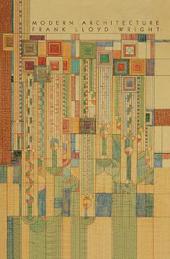
|
Modern Architecture: Being the Kahn Lectures for 1930
Hardback
Main Details
| Title |
Modern Architecture: Being the Kahn Lectures for 1930
|
| Authors and Contributors |
By (author) Frank Lloyd Wright
|
|
Introduction by Neil Levine
|
| Physical Properties |
| Format:Hardback | | Pages:208 | | Dimensions(mm): Height 267,Width 210 |
|
| Category/Genre | Architecture |
|---|
| ISBN/Barcode |
9780691129372
|
| Classifications | Dewey:720 |
|---|
| Audience | | General | | Tertiary Education (US: College) | | Professional & Vocational | |
|---|
| Edition |
Revised edition
|
| Illustrations |
7 halftones.
|
|
Publishing Details |
| Publisher |
Princeton University Press
|
| Imprint |
Princeton University Press
|
| Publication Date |
10 February 2008 |
| Publication Country |
United States
|
Description
Modern Architecture is a landmark text--the first book in which America's greatest architect put forth the principles of a fundamentally new, organic architecture that would reject the trappings of historical styles while avoiding the geometric abstraction of the machine aesthetic advocated by contemporary European modernists. One of the most important documents in the development of modern architecture and the career of Frank Lloyd Wright, Modern Architecture is a provocative and profound polemic against America's architectural eclecticism, commercial skyscrapers, and misguided urban planning. The book is also a work of savvy self-promotion, in which Wright not only advanced his own concept of an organic architecture but also framed it as having anticipated by decades--and bettered--what he saw as the reductive modernism of his European counterparts. Based on the 1931 original, for which Wright supplied the cover illustration, this beautiful edition includes a new introduction that puts Modern Architecture in its broader architectural, historical, and intellectual context for the first time.The subjects of these lively lectures--from "Machinery, Materials and Men" to "The Tyranny of the Skyscraper" and "The City"--move from a general statement of the conditions of modern culture to particular applications in the fields of architecture and urbanism at ever broadening scales. Wright's vision in Modern Architecture is ultimately to equate the truly modern with romanticism, imagination, beauty, and nature--all of which he connects with an underlying sense of American democratic freedom and individualism.
Author Biography
Neil Levine, the Emmet Blakeney Gleason Professor of History of Art and Architecture at Harvard University, is the author of "The Architecture of Frank Lloyd Wright" (Princeton).
Reviews"The endpapers of Modern Architecture--which Princeton University Press has reissued in a facsimile of its original 1931 edition--are embellished with Wright aphorisms that recall the improving mottoes typically displayed in Arts and Crafts interiors... The Princeton reprint has an authoritative introduction by the architectural historian Neil Levine."--Martin Filler, New York Review of Books "Perhaps some people think you can have too many books on Frank Lloyd Wright, but I believe there's always room for more. This year, it's a scholarly duo from Princeton University Press: The Essential Frank Lloyd Wright: Critical Writings on Architecture, edited by Wright scholar Bruce Brooks Pfeiffer (453 pages, $49.95) and the essential Modern Architecture: Being the Kahn Lectures for 1930, with a new introduction by Neil Levine (115 pages, $29.95)."--Mary Chandler, Rocky Mountain News Praise for the original edition: "Exuberant, confessedly romantic, insistently individualistic, at times even florid and rhetorical, [Modern Architecture] is still (and I say it, who fought my rising enthusiasm at every turn of a page) the very best book on modern architecture that exists."--Catherine Bauer, New Republic
|